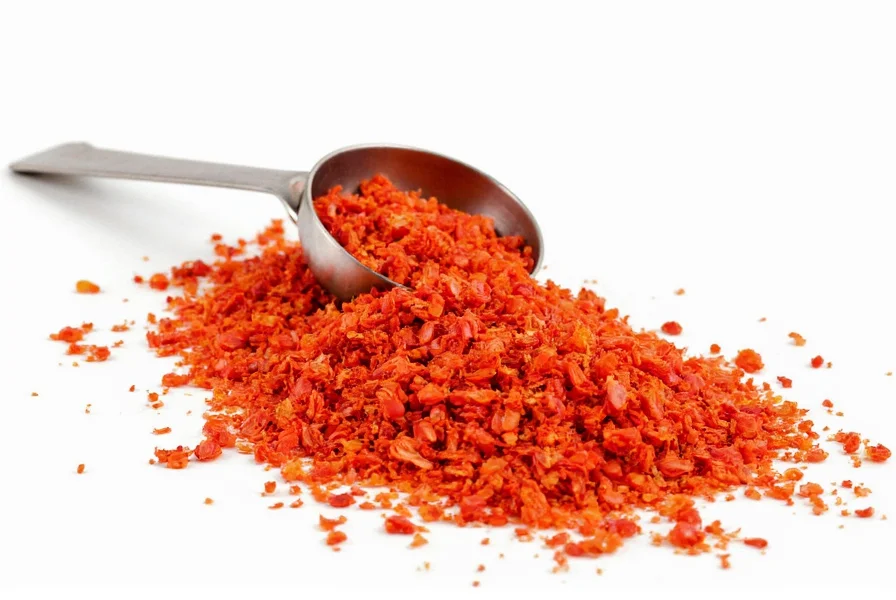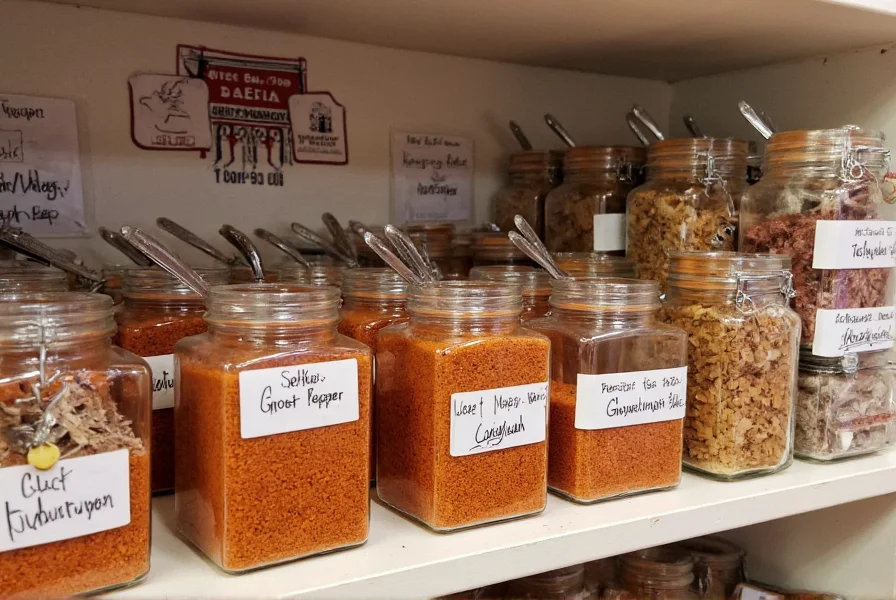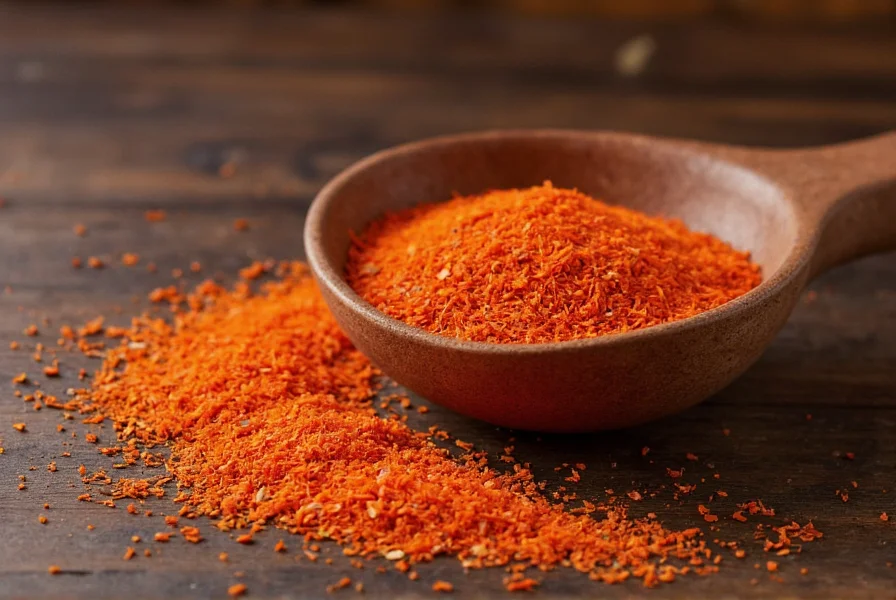When exploring how to use ghost pepper flakes safely in your kitchen, understanding their extreme heat level is crucial. Unlike standard red pepper flakes that measure around 15,000 SHU, ghost pepper varieties sit among the world's hottest peppers. The Bhut Jolokia pepper earned recognition as the hottest in the world from 2007-2011 before being surpassed by even hotter varieties.
Understanding Ghost Pepper Flakes Characteristics
Ghost pepper flakes maintain the distinctive characteristics of their fresh counterparts while offering extended shelf life and concentrated flavor. The drying process intensifies certain flavor compounds while preserving the capsaicin responsible for their legendary heat.
| Pepper Variety | Scoville Heat Units | Ghost Pepper Flakes Equivalent |
|---|---|---|
| Ghost Pepper (Fresh) | 800,000-1,041,427 SHU | 1:1 reference point |
| Cayenne Flakes | 30,000-50,000 SHU | Approximately 20x milder |
| Standard Red Pepper Flakes | 5,000-15,000 SHU | 50-100x milder |
| Habanero Flakes | 100,000-350,000 SHU | 2-8x milder |
Flavor Profile Beyond the Heat
While the ghost pepper flakes heat level dominates discussions, these flakes offer a complex flavor profile that many enthusiasts appreciate. Before the intense heat registers (which can take 30-45 seconds), you'll notice:
- A subtle fruity aroma with berry-like undertones
- Earthy, smoky notes from the drying process
- A brief sweet impression that quickly gives way to heat
- Floral hints in some varieties, particularly when used sparingly
This complexity makes cooking with ghost pepper flakes an interesting challenge for chefs who understand how to balance their intense properties with complementary ingredients.

Safe Handling Practices for Ghost Pepper Flakes
Proper handling is non-negotiable when working with ghost pepper flakes. The concentrated capsaicin can cause severe irritation to skin and eyes, and the fine particles become airborne easily.
Follow these safety protocols:
- Always wear nitrile gloves when handling ghost pepper flakes
- Use in well-ventilated areas to avoid inhaling airborne particles
- Measure over a plate or container to prevent spills
- Avoid touching your face during and immediately after handling
- Have dairy products (milk, yogurt) nearby to neutralize accidental exposure
If you experience skin irritation, apply milk or yogurt to the affected area rather than water, which spreads the capsaicin. For eye exposure, flush with saline solution and seek medical attention if irritation persists.
Practical Culinary Applications
The key to successfully incorporating ghost pepper flakes lies in understanding their delayed heat response and extreme potency. Unlike milder chili flakes that deliver immediate heat, ghost peppers create a building sensation that peaks after 30-60 seconds.
For ghost pepper flakes usage recommendations, consider these approaches:
- Start with 1/16 teaspoon per serving and wait 5 minutes before adding more
- Add early in cooking for infused heat that mellow slightly
- Use as finishing flakes for immediate, intense heat experience
- Infuse in oil first to distribute heat more evenly
- Pair with cooling ingredients like coconut milk, avocado, or dairy
Excellent applications include:
- Barbecue rubs (use sparingly with brown sugar to balance heat)
- Hot sauces where extreme heat is desired
- Marinades for meats that can handle intense spice
- Specialty Bloody Mary cocktails for adventurous drinkers
- Infused salts for dramatic finishing touches
Storage Recommendations for Maximum Freshness
Proper ghost pepper flakes storage tips ensure maximum flavor retention and safety. Exposure to light, air, and moisture degrades quality and can create handling hazards.
Follow these storage guidelines:
- Store in airtight glass containers away from light
- Keep in a cool, dark pantry (not above the stove)
- Never store in humid environments like near the sink
- Label containers clearly to prevent accidental misuse
- Use within 6-12 months for optimal flavor (though safe indefinitely)

Ghost Pepper Flakes vs Other Chili Flakes
Understanding the differences between ghost pepper flakes vs cayenne and other chili products helps determine appropriate usage scenarios.
- Heat progression: Ghost peppers deliver delayed, building heat while cayenne provides immediate burn
- Flavor complexity: Ghost peppers offer more nuanced flavor beneath the heat
- Usage ratio: You need significantly less ghost pepper flakes compared to milder varieties
- Culinary applications: Ghost peppers work best in specialized applications while cayenne is more versatile
- Safety considerations: Ghost peppers require more stringent handling protocols
For most home cooks, ghost pepper flakes serve as a specialty ingredient rather than an everyday seasoning. Reserve them for dishes where extreme heat is the featured element rather than just background spice.
Avoiding Common Mistakes
Many enthusiasts make critical errors when first experimenting with ghost pepper flakes. Understanding these pitfalls prevents ruined dishes and potential safety issues.
- Adding too much at once: Start with minuscule amounts and wait for heat to develop
- Not wearing gloves: Capsaicin transfers easily to sensitive areas
- Using in dishes for children: The delayed heat response can surprise unsuspecting eaters
- Mixing with other superhots: Combining with Carolina Reaper or similar creates unnecessary risk
- Poor storage practices: Leads to degraded quality and potential contamination
Remember that the heat from ghost pepper flakes builds gradually. What seems mild initially can become overwhelming minutes later. Always inform guests when ghost peppers are present in dishes.











 浙公网安备
33010002000092号
浙公网安备
33010002000092号 浙B2-20120091-4
浙B2-20120091-4